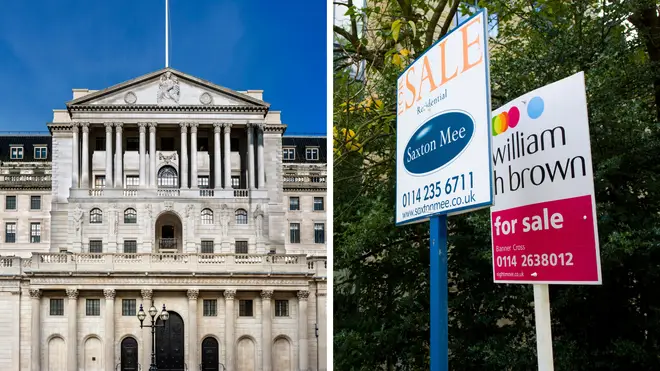
Clive Bull 1am - 4am
3 November 2022, 14:10

The Bank of England hiked interest rates by 0.75 per cent to 3 per cent on Thursday.
Interest rates are a measure designed to control runaway inflation, which has been battering British households in recent months.
Thursday's rise is the single biggest increase since 1989, and the Bank warned the UK is on course for the longest recession since reliable records began a century ago.
But what does the rate hike actually mean for households? And does anyone stand to gain?
The Bank of England is tasked with keeping inflation - a general increase in the prices of things - under control, targeting 2 per cent a year.
But in recent months inflation has started to run away. It hit 9.4 per cent in June and the Consumer Prince Index rose by 10.1 per cent in October.
Read more: Britain faces 'longest recession in history' as Bank of England hikes interest rate 0.75% to 3%
In response, the Bank can increase interest rates. That makes it more expensive to borrow money, so people are likely to spend less.
In theory, if people - and businesses - are forced to spend less, demand will decrease and prices will fall as a result.

Affording childcare is 'absolutely extortionate and crippling' says this mother
The most obvious impact is that it will become more expensive for people to pay off their mortgages.
People taking out a new loan will soon be quoted a higher interest rate as a result of the Bank's change.
And those whose mortgages are being renegotiated will likely have to deal with larger bills than they had in the past.
The Bank said households set to renew their mortgages could see them increase by around £3,000 a year.
Read more: When do pensioners get their cost of living payment 2022?
The increase in mortgage rates will not just affect those who own property.
Tax expert David Hannah, chairman of Cornerstone Tax, said: "Renters will also feel the effects of today’s interest rate hike.
"They will find it more difficult to find available properties as landlords are set to experience higher mortgage rates which could deter them from renting their properties and look to sell instead."

Inflation is a measure of how much the price of the things that the average household buys is changing.
Brits have faced soaring energy bills and their food shop is also stretching household budgets, both of which are key drivers of inflation.
The war in Ukraine is one reason for this, as well as pandemic-related issues in the supply chain.

Nurses are not being paid enough money, says Matt Frei
Savers will benefit a little from the rate hike as they will get more interest on money in their accounts.
However, less than a third of the interest rate hikes since November, when the Bank started increasing rates, had actually made its way to savers by August.
The impact of the increased interest that savers get will also be more than offset by inflation, which is decimating savings.
In the wake of the announcement value of the pound fell against the dollar and the euro.
Shadow chancellor Rachel Reeves said Thursday's figures show the Conservatives have "weakened the foundations of our economy".
"[Rishi] Sunak must face up to his mistakes," she said.
Trades Union Congress head of economics Kate Bell said people are "paying a high price for the Conservatives crashing the economy.
"Today's interest hike will increase the risk of a bleak recession this winter, and it will hammer businesses and people paying a mortgage," she said.